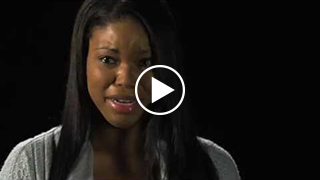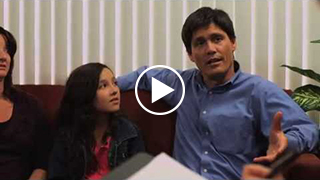TV / Cable
It’s Up to Us is a multi-media education and awareness campaign for the county of Riverside. With positive, strength-based creative messaging, the campaign aims to encourage Riverside residents to speak up and get help, or listen up and offer support to those experiencing mental health challenges. Below are some of the campaign’s TV materials:
-
Chess
This spot is about encouraging help seeking behavior at early signs of a mental illness and not waiting for symptoms to worsen or resolve on their own. We see individuals having meaningful connections with family and friends after getting help for their mental illness. Flashbacks reveal some of the symptoms they were ignoring. The spot ends with a statement of encouragement to seek help right away if they have concerns about their mental health.
-
Piano
This spot is about encouraging help seeking behavior at early signs of a mental illness and not waiting for symptoms to worsen or resolve on their own. We see individuals having meaningful connections with family and friends after getting help for their mental illness. Flashbacks reveal some of the symptoms they were ignoring. The spot ends with a statement of encouragement to seek help right away if they have concerns about their mental health.
-
Grandpa
This spot is about encouraging help seeking behavior at early signs of a mental illness and not waiting for symptoms to worsen or resolve on their own. We see individuals having meaningful connections with family and friends after getting help for their mental illness. Flashbacks reveal some of the symptoms they were ignoring. The spot ends with a statement of encouragement to seek help right away if they have concerns about their mental health.
-
College Girl
This spot is about starting the conversation with a loved one who you suspect may be experiencing a mental illness. The outward signs of a mental illness are often behavioral. By targeting individuals who are in a position to notice these subtle changes, we aim to empower them to start the conversation, and encourage help seeking.
-
Best Friends
This spot is about starting the conversation with a loved one who you suspect may be experiencing a mental illness. The outward signs of a mental illness are often behavioral. By targeting individuals who are in a position to notice these subtle changes, we aim to empower them to start the conversation, and encourage help seeking.
-
Wife
This spot is about starting the conversation with a loved one who you suspect may be experiencing a mental illness. The outward signs of a mental illness are often behavioral. By targeting individuals who are in a position to notice these subtle changes, we aim to empower them to start the conversation, and encourage help seeking.
-
Know the Signs (Animated)
This TV spot shares that even though warning signs for suicide can be subtle, they are there. It emphasizes the importance of trusting what you see and feel and asking your loved one if they are thinking about suicide.
-
Carlos
This spot focuses on Carlos, a Latino sporting goods store owner. Carlos tells us that having bipolar disorder is not easy, especially because of having to deal with other people’s prejudices. He mentions a few typical symptoms and shares that what was most helpful was getting information and help, besides his family’s support. His wife agrees and looks happy and proud of him. Carlos tells us that his business and family are now doing well, making it clear that a person with mental health problems can have a successful life. The end tag urges viewers to change their perceptions about mental illness and provides a call to action to visit the campaign’s website.
-
Mark & Rob
A general market TV spot encouraging people to learn to recognize the signs and talk openly about mental health challenges.
-
Coach John
A general market TV spot focused on social stigma. This spot communicates that recovery is possible and help is available to again lead a full and productive life.
-
Older Adults
A TV spot targeting people ages 60 and older. It communicates that depression is not a normal part of aging and encourages those affected to learn more and seek help.
-
Tyler
A TV spot targeting transitional age youth and young adults. It shares that mental health challenges can affect anyone and the importance of learning to recognize the signs, and seek help. It also demonstrates that the support of friends can make a difference.
-
Talk Openly
This TV spot encourages viewers to “speak up” and talk openly about mental illness and people in their lives impacted by it. One in five people experience a mental health challenge, and together we can make a difference in their paths to recovery by opening up about this topic.
-
What Would You Do
A general market TV spot communicating warning signs and risk factors of suicide, while modeling support from a loved one. This spot was developed to educate the community in recognizing signs and to seek help for themselves or others.
-
It’s Not Always Easy
A general market TV spot communicating warning signs and risk factors of suicide, while modeling support from a loved one. This spot was developed to educate the community in recognizing signs and to seek help for themselves or others.
-
Take It Seriously
A stigma reduction TV spot, urging young adults to take their mental health seriously and get help early.
-
Answers
This TV spot addresses common questions and concerns regarding mental health, and that answers can be found at Up2Riverside.org.
-
Head On
A stigma reduction TV spot challenging stereotypes about mental illness through a display of different characters living full and productive lives.
-
Recovery (Depression)
This TV spot is about a woman, a nurse, who is experiencing depression. Although she helps other people get better, she did not get help for herself at first, hoping symptoms would go away on their own. Viewers are encouraged to take symptoms of mental illness seriously and get help. The spot communicates that depression can get better with help and recovery is possible.
-
Full Life (PTSD)
This TV spot is about a valued employee, who experienced and received treatment for Post Traumatic Stress Disorder (PTSD). The spot communicates that there are no limitations to what he can accomplish. Viewers are encouraged to change their perceptions of mental illness.
-
Looking Forward (Schizophrenia)
This TV spot is about on a man who is living with schizophrenia. He reflects on his initial struggle with accepting the illness, in particular the fear of what others might think of him and implications for his future. With proper treatment and support, he continues to live a fulfilling life. Viewers are encouraged to change their perceptions of mental illness.
-
Something Bigger
A TV spot targeting parents to raise awareness of the warning signs of mental or behavioral health challenges in children and that catching problems early can make all the difference.
-
Sharing
This TV spot provides information about the warning signs of suicide. It emphasizes that it is not always easy for people to share their feelings and the importance of getting educated (and paying attention) to potential warning signs.
-
Best Qualities
This TV spot aims to reduce misperceptions about mental illness with the message that mental illness is common and can affect anyone. People are more than their illness and should be seen for all their great qualities rather than defined by the label of their diagnosis.




























 Helpline (951) 686-HELP
Helpline (951) 686-HELP